Bangladesh’s roadblocks to becoming a successful democracy
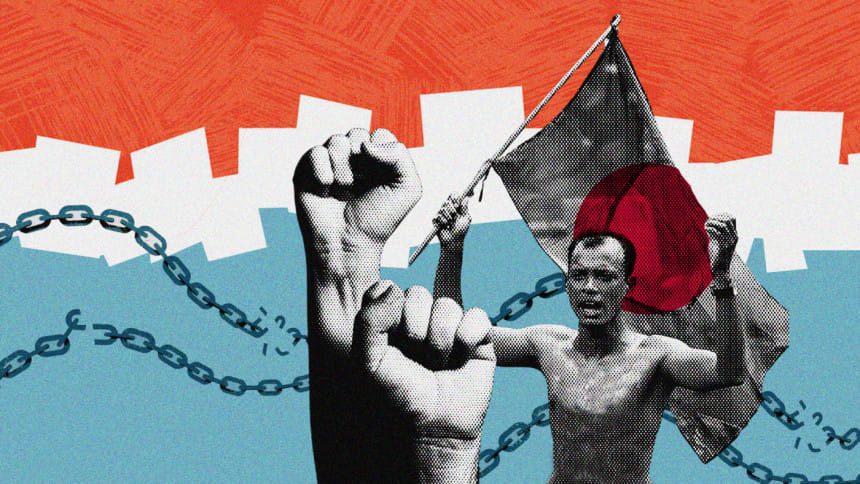
Bangladesh has embarked on an ambitious journey to democratise. It is ambitious because successful democracies are rare in the world. Many factors facilitate democratisation, yet public discourse in Bangladesh since the fall of the Hasina regime has focused mainly on one factor.
Bangladesh has never been a successful democracy in its history, yet the public and the interim government believe that an optimal constitutional arrangement can prevent authoritarianism and ensure the maintenance of democracy. However, social science has researched other factors in democratisation for more than five decades. It is important to recognise how these may impact Bangladesh's path to becoming a successful democracy: economics, the order of institutionalisation, the rule of law, and values. Scholars have focused on one of these or in combination.
First, it is probably worth defining what a "successful democracy" is. An electoral democracy is a country in which elections are free and fair. Bangladesh has probably only had four elections which were free and fair, and held under the auspices of a caretaker government. But we can question if those were meaningful free and fair elections even under caretaker governments because the opposition rarely acknowledged the results, even when elections were credible. A party unwilling to serve as the loyal opposition is eliminating important checks and balances. Both the Awami League and BNP are implicated in this abdication of duty.
I think the people of Bangladesh want more than just an electoral democracy, though. I think they want a liberal democracy. A liberal democracy is one where there are free and fair elections to allow for majoritarian rule, but also protections against majoritarian rule. This entails checks and balances to prevent a government from overreaching civil rights for individuals and citizens. Examples of checks and balances are bicameralism and an independent judiciary—topics that are being discussed. Having civil liberties would also prevent a private citizen from being abducted by the government and tortured in secret, in an Aynaghar for example. In theory, Bangladesh had checks and balances in an independent judiciary earlier in Hasina's regime, but when push came to shove, a Supreme Court Justice was forced to flee the country. This suggests that constitutionalism alone is not enough to prevent authoritarianism, as a forceful leader can overcome constitutional guardrails.
There are also distinctions to be made between different types of authoritarianism. In a closed authoritarian regime, there is no pretext of elections. Under electoral authoritarianism, elections are held but without real competition between parties. Bangladesh under Hasina's rule since 2009 was an electoral authoritarian state. Political scientists have identified a number of these hybrid regime types since the early 2000s, when nascent democracies of the 1990s—also known as "3rd wave" democracies—failed to establish liberal democracy. If anything, there has been a democratic backsliding in the world, where now seven in 10 people live in some type of authoritarian regime, when this number was five in 10 a little more than 20 years ago. Ninety-three percent of South Asians live in some sort of authoritarian regime, only second to the Middle East.
Liberal democracies are rare. As mentioned, and is widely known, there have been only a few dozen or so countries that have become liberal democracies, and most of them are wealthy and in the West. Social scientists have thus focused on the impact of wealth or income on democracy. It has been a finding confirmed over many decades that only rich countries are liberal democracies. While there is a strong correlation between GDP per capita and liberal democracy, from a theoretical perspective, some social scientists are not sure why: does economic growth lead to more education, or does economic growth lead to a growing middle class that demands democracy? Fighting for more meritocratic openings in civil service jobs is a very middle-class demand.
While Bangladesh has seen considerable economic growth over the past few decades, its GDP per capita in nominal dollars is still only around $2,500. It does mean Bangladesh is richer than one-third of the world, but poorer than two-thirds. No country at this income level has become a liberal democracy. If official governmental accounting has to be revised, and probably downward, it may mean that Bangladesh is even poorer, putting it in the bottom quartile of countries.
An important concept in the study of democratisation is ordering. We have already looked at one type of ordering: economic growth seems to precede democratisation. However, economic growth would appear to be necessary, but not sufficient for democracy, as there are wealthy and rapidly growing countries that are not democratic, such as oil-rich countries in the Middle East and China. An important ordering to consider is that of democratic institutions and democracy. The view of many is that if you build and maintain democratic institutions—at the minimum, free and fair elections—then democracies can develop, become more liberal, and be sustained. But this is not borne out empirically. Let us also consider the ordering of the rule of law and democracy. Many early democratic countries in the West had established the rule of law before they became democratic, meaning before they enfranchised the majority of the population. Some scholars of democratisation thus describe trying to establish a democracy and a rule of law at the same time as amounting to building a car as you are driving it—it is difficult.
Bangladesh ranks very low on the rule of law, but this has always been true. Many critics of the Hasina regime complain that Bangladesh's reputation as a corrupt country has worsened in the past 15 years. While there have been high levels of corruption by elites in the Hasina regime—and the most egregious cases will be investigated and stolen money will be repatriated—corruption in Bangladesh has a long history. Bangladesh was considered the most corrupt country in the world, according to the 2005 Transparency International's Corruption Perceptions Index. It is likely that since then Bangladesh's rankings have been helped by the inclusion of even more corrupt countries in the survey. But since 2009, Bangladesh's rankings have dropped only slightly, from being ranked 139th out of 180 countries in 2009, to 149th out of 180 countries last year. This drop might reflect more rampant looting by some elites in the Hasina-government, and is unfortunate, but it does not mean Bangladesh was not highly corrupt beforehand. In fact, the highest ranking Bangladesh achieved on this ranking was 136 out of 177 countries, in 2013 during the Hasina regime. There has been a global upward trend in corruption. Among many variables, the social science literature on corruption seems to find that low GDP per capita predicts corruption. Can yearly financial attestations then reduce opportunities for corruption? It's possible, but what are the root causes of corruption in the first place?
While Transparency International's rankings are based on perceived levels of corruption at the elite level and by business executives, there are two ways to examine the lack of the rule of law beyond the elite level and at the citizen level in Bangladesh. First, every day citizens encounter corruption in their interactions with lower-level government officials frequently. Indeed, Transparency International Bangladesh (TIB) finds that nearly 71 percent of households in Bangladesh face corruption. This has not changed much in the past few decades.
Second, there is a lack of rule of law at the individual citizen level as well. There are Bangladeshis who feel it is their right to take the law into their own hands. We have certainly witnessed this since the fall of the Hasina regime, with mob justice and lynching occurring frequently. The interim government has rightly been criticised for not addressing this issue with urgency. But past and more longitudinal accounts published in a report in the Dhaka Tribune shows that at least 625 people were killed by mobs from 2013 to 2020. One activist told the daily, "The idea that a person can be beaten to death if he commits a wrong—it has been deeply ingrained in the minds of the people of Bangladesh." So, it is not just the elites who feel they are above the law, but a vast swath of citizens feel they can take the law into their own hands. Again, Bangladesh needs to democratise and establish the rule of law at the same time. The interim government has initiated six commissions that deal with some aspects of the rule of law, such as the judiciary and corruption, but I don't think judicial reforms can stem the widely held belief that citizens can take the law into their own hands. These types of values take decades to change.
We can examine other slowly evolving citizen values that impact democracy. While economic preconditions have been examined in successful democracies since the late 1950s, scholars have also looked at what they have called "political culture" since then as well. The argument is that democracies can only be sustained when people have certain values, like trust and tolerance of differences. The values of "civic culture" seem to change slowly over time, but there are drivers of it. In fact, in a more nuanced view than the economic determinists, the late political scientist Ronald Inglehart and his colleagues argued that economic growth does not lead to sustained democracy directly, but indirectly by improving civic culture, which in turn fosters liberal democracy. The relevant question might then be why some countries see improvements in civic values with economic growth while others do not.
In a recent empirical test, it was shown that countries with more citizens who are open to diversity and respect individual rights are more likely to sustain liberal democracies in the long run, while per capita income and trust were not found to have an impact. In this study, the data for Bangladesh reveal low scores on openness to diversity. This study looks at values by cohort, and the study preceded the release of the most recent survey data it was based on—the World Values Survey; the latest wave in Bangladesh was carried out in 2018. But when looking at the question items that the openness to diversity variable is based on for the 2018 survey results, respect for individual rights is low and there doesn't appear to be any variation in cohorts, with the youngest being 16-29 at the time of the survey. This means that Bangladesh would still score low on the openness to diversity measure, and for its youngest cohort, in the latest wave of this survey.
In sum, social scientists have looked at many different and important predictors of democratisation. There is also a vast literature on social movements, protests, and the overthrowing of regimes. Regime change and transitions to democracy are much more common than successful democratisation. Whether we look at income, the rule of law, or values, Bangladesh ranks low on these predictors of democratisation. Do we need to be deterministic about this and believe a less wealthy country like Bangladesh cannot become a successful, liberal democracy just because of its lack of resources? No, but public discourse should consider seriously why lower-income countries struggle with authoritarianism, corruption, and challenging civic values. On the other hand, while the younger generation's values may not align with more global predictors of democratisation, they are showing some civic values which aren't easily captured by Western social scientists. First, they took many risks, and hundreds of lives were lost during the uprising. And after looters stormed the Gono Bhaban and the Jatiya Sangsad, students stopped them from looting. When the police were afraid to do their jobs, students controlled traffic. When some mob lynchings took place, students protested. They helped protect Hindu temples. So, it is possible there is a mismatch between what others have examined over many decades in terms of political values and what we are seeing among the younger generation. But a lack of openness to diversity and respect for individual rights as seen in recent survey data may still serve as an obstacle to Bangladesh becoming a liberal democracy.
Rumel Mahmood, PhD, is a healthcare data analyst and researcher based in the Greater Boston area, US.
Views expressed in this article are the author's own.
Follow The Daily Star Opinion on Facebook for the latest opinions, commentaries and analyses by experts and professionals. To contribute your article or letter to The Daily Star Opinion, see our guidelines for submission.

 For all latest news, follow The Daily Star's Google News channel.
For all latest news, follow The Daily Star's Google News channel. 
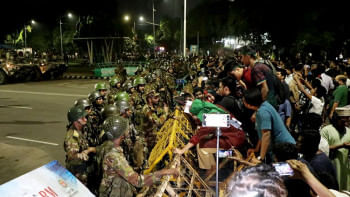
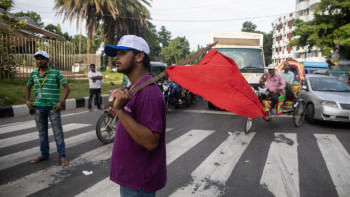




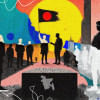
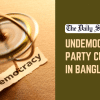


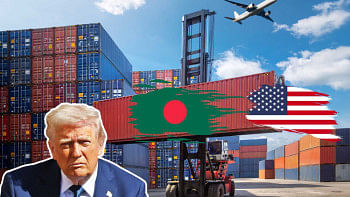
Comments